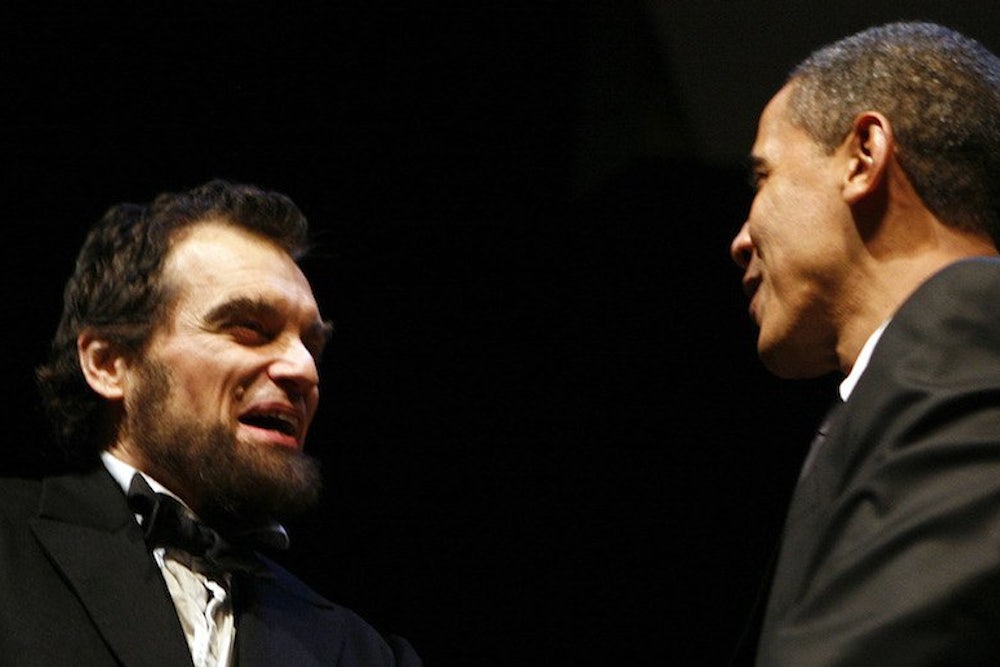No matter how you sell it, or who makes the pitch, the notion that we should commemorate the end of the Civil War and the reunion of the United States with a federal holiday is going to encounter political resistance in the South. We don’t even need to poll it. In fact, we probably wouldn’t call the region “The South” if its political identity weren’t still interwoven with a glossy conception of the Confederacy.
This isn’t entirely an artifact of white supremacy, or of secessionist sympathies. It’s also a matter of state and family pride. If you’re a proud Georgian and your great, great, great grandfather died fighting for the Confederacy, you might not take kindly to the federal government celebrating the day his death was rendered in vain—even if your general perspective on the war and the Lost Cause is modern and progressive.
And thus, you can imagine that even the most enlightened liberal southern members of Congress (to the extent that they still exist) would be at pains to support legislation designating April 9—when Robert E. Lee surrendered to Ulysses S. Grant—a federal holiday. Downplay the fact of Southern surrender, dub it Reunion Day, and they’d still face backlash at home.
But they should ignore the backlash. Or rather, those Southerners predisposed to taking the concept of Reunion Day personally should update their views. Not the neo-Confederates or the broader Southern right wing, obviously. But liberal, or liberally minded Southern whites who crouch defensively when Northerners criticize the rebellion. Appomattox was 150 years ago this week. From such a great distance, it shouldn’t be difficult—for those inclined—to stop internalizing attacks on the confederacy of the 1860s as attacks on the South today.
Commemorating April 9 would require a segment of Southern whites to make one large, but straightforward mental leap.
My proposal was two fold: First, wipe the federal books clean of monuments to the confederacy; second, celebrate the anniversary of the effective end of the rebellion—or, if you prefer, the effective beginning of reunification.
Neither proposal speaks to the character of individual, rank and file soldiers. Contra Ed Kilgore—a Southern liberal who writes eloquently about his roots, and is largely supportive of a federal reunion holiday—the purpose of the bookkeeping changes is not “to extend an anathema to the plain white non-slaveholding folk of the Confederacy, those in uniform or left semi-starving at home, who had little control over their participation in the Rebellion, and were often notably un-enthusiastic about the Lost Cause.” The purpose is to cement a national consensus that the Confederate regime—its political and military leaders, and its goals, not its civilians and conscripts—was truly odious.
It’s also to disentangle modern Southern identity from that of a Confederate republic this country never recognized. Not to eradicate monuments and memorials, but to turn them into museums—and to signify that while the reunited states would never obstruct displays like this, it doesn’t condone them either. Indeed, an April 9 holiday would amount to a tacit public acknowledgment that celebrating the Confederacy is a cultural aberration, rather than just another subculture among many.
The truth is that the political will to establish a holiday like this doesn’t exist, and probably won’t until at least the bicentennial of reunification. To gauge interest in the idea, I reached out to G. K. Butterfield—the chairman of the Congressional Black Caucus, who happens to represent a district in the once-confederate state of North Carolina. Through a spokesperson, he declined to comment.
But the CBC’s immediate priorities demonstrate by implication that the country isn't prepared at the moment to commemorate the end of the Civil War in grandiose fashion. The CBC is throwing all of its heft into pressuring the Republican Congress to fix the Voting Rights Act, which the Supreme Court recently hobbled. And it stands in support of a federal holiday commemorating the abolition of slavery. But not the end of the war.
That’s a crucial difference. And while both events merit celebration, there’s critical value in rolling them into one. In the Southern right’s mythical telling, the Civil War wasn’t really about slavery at all, but about governing principles that still define conservatism. Those principles took on enormous retrospective significance as a consequence of that historical revision, and thus contribute to the impoverishment of millions of Southern blacks to this day.
As Kilgore explained, the reason for celebrating Appomattox, and not the abolition of slavery alone, is that “the same horrific ideas—the inferiority of people of color, the power of states to nullify and secede, the unconstitutional nature of democracy—keep coming back over and over again.”
And to the extent that the legacy of the Civil War still scars the South, or explains its economic history, a Reunion Day would serve as a reminder that the fathers of the Confederacy—who would stoop to anything, including treason, to preserve slavery—are the ones to blame.
